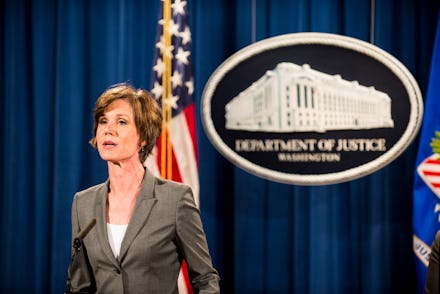President Trump fires acting Attorney General Sally Yates for questioning Muslim ban

On Monday night, President Donald Trump promptly fired acting Attorney General Sally Yates for publicly questioning the legality of his executive order denying entry to all refugees as well as citizens of seven Muslim-majority nations and ordering Department of Justice lawyers not to defend it in court.
According to a White House statement, Yates had "betrayed the Department of Justice by refusing to enforce a legal order designed to protect the citizens of the United States," and was an "Obama administration appointee who is weak on borders and very weak on illegal immigration."
"It is time to get serious about protecting our country," the statement said. "Calling for tougher vetting for individuals traveling from seven dangerous places is not extreme. It is reasonable and necessary to protect our country."
Yates, an appointee of former President Barack Obama, was serving as head of the Department of Justice until Trump's replacement is confirmed by the Senate. According to the White House statement, Trump has picked U.S. Attorney for the Eastern District of Virginia Dana Boente as Yates' replacement.
In a letter to top DOJ lawyers on Monday evening, Yates wrote she disagreed with the DOJ's Office of Legal Counsel's vetting of the travel bans and "at present, I am not convinced that the defense of the executive order is consistent with [her] responsibilities nor am I convinced that the executive order is lawful."
"Consequently, for as long as I am the acting attorney general, the Department of Justice will not present arguments in defense of the executive order, unless and until I become convinced that it is appropriate to do so," Yates had concluded.
Yates' assessment of the order's legality was consistent with federal court rulings ordering stays on deportations of the affected individuals and that they be given access to attorneys — orders members of Congress as well as attorneys say officers with U.S. Customs and Border Protection, part of the Department of Homeland Security, have illegally ignored, Yates, as the nation's highest acting law enforcement official, was obligated to act in accordance with her assessment of the executive order's constitutionality rather than the interests of the president.
As the New York Times noted, Yates' letter was largely a symbolic move as Trump's attorney general nominee, Alabama Sen. Jeff Sessions, will likely be approved in coming days. But her refusal to toe the new administration's line came at exactly the time the new president is attempting to move forcefully with his agenda. Several days ago, Trump fired four senior State Department officials under unclear circumstances, leaving a major gap in the department's management.
Despite Trump's insistence the ban is intended to protect the U.S. from terror attacks, no citizens of the seven countries in question had committed attacks resulting in fatalities in the U.S. since 9/11. The travel ban is unlikely to prevent future attacks for a number of reasons, including the fact the vast majority of individuals committing them are either U.S. citizens or permanent residents.
Over the weekend, CNN reported the executive order was hastily drafted by an inner circle of Trump advisers including former Breitbart executive Stephen Bannon and may have gone into force without thorough vetting by relevant agencies or DOJ lawyers. The announcement of the order, and subsequent chaos of its implementation at airports around the United States as U.S. Customs and Border Protection officers detained an unknown number of travelers at airports, triggered nationwide protests.
Reuters also reported Monday night the DHS and State Department had approved 872 refugees for entry despite Trump's order, writing they were considered "in transit" and thus cleared for resettlement before the order went into force.
Jan. 30, 2017, 10:42 p.m.: This story has been updated.